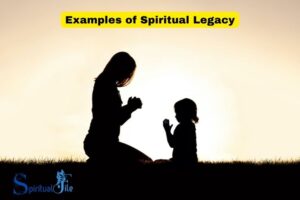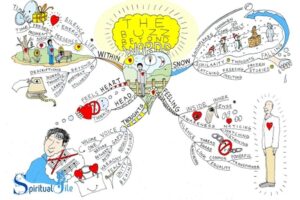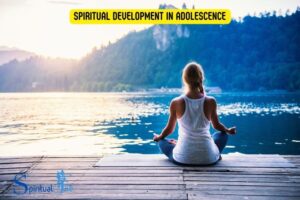Examples of Spiritual Struggles: Challenges!
Spiritual struggles refer to the challenges, conflicts, and dilemmas individuals often face regarding their beliefs, values, and faith.
Examples of spiritual struggles can range from questioning the existence of a higher power, doubting one’s own beliefs, grappling with guilt over perceived religious transgressions, or feeling disconnected from your spiritual community.
Spiritual struggles are often an essential aspect of an individual’s spiritual journey. These struggles arise when there is a conflict between personal beliefs and experiences.
For instance, an individual may question their faith after a traumatic event or feel guilty because they’ve strayed from their religion’s teachings.
Spiritual struggles can also occur when individuals feel a lack of connection or fulfillment within their spiritual community. This can lead to feelings of alienation and loneliness.
While spiritual struggles can be challenging, they often lead to growth and a deeper understanding of one’s beliefs. Such struggles can prompt individuals to seek answers, explore different perspectives, and engage in self-reflection.
Ultimately, navigating through spiritual struggles can strengthen one’s faith and spiritual connection, fostering personal development and resilience.
6 Types of Spiritual Struggle Examples
| Type of Spiritual Struggle | Examples |
|---|---|
| Divine | Difficulty in believing in God or a higher power, experiencing anger towards God, feeling abandoned by God, believing that God is punishing you. |
| Moral | Regret about past ethical decisions, confusion about moral choices, feeling that your life is morally unfulfilled, guilt over perceived sins or wrongdoings. |
| Interpersonal | Tension with others over religious or spiritual differences, feeling out of place in a religious community, dealing with the spiritual implications of a broken relationship. |
| Intrapersonal | Struggling to integrate spirituality into daily life, questioning personal religious or spiritual beliefs, experiencing doubt about spiritual practices. |
| Ultimate Meaning | Seeking the purpose of life, questioning life’s value, contemplating about life after death. |
| Religious Frustration | Feeling unfulfilled or unsatisfied with religious practices, disbelief or disappointment in religious teachings or leaders. |
Key Takeaway

Five Facts About Spiritual Struggles
Internal Conflicts
Spiritual struggles often manifest as internal conflicts, such as doubt, guilt, or searching for meaning.
These struggles can cause profound emotional distress and lead individuals on a journey of self-discovery and spiritual growth.
Struggling With Doubt And Uncertainty About One’s Beliefs
Do you ever find yourself questioning your faith or doubting your spiritual beliefs? Many people go through periods of uncertainty and doubt when it comes to their spirituality.
Here are some common struggles that individuals may face in this regard:
- Feeling conflicted about the existence of a higher power: It’s natural to have moments of skepticism and wonder if there truly is a higher being guiding our lives. These doubts can arise from personal experiences, philosophical questions, or scientific discoveries.
- Questioning religious teachings: Sometimes, individuals may find themselves questioning the teachings of their religion. This can be prompted by a desire for a deeper understanding, conflicts between teachings and personal values, or exposure to differing perspectives.
- Wavering faith during challenging times: Difficult moments in life, such as the loss of a loved one or a personal crisis, can shake one’s faith to its core. It’s during these times that doubts and uncertainties may become heightened.
Battling With Guilt And Shame Over Past Actions
Guilt and shame can be powerful internal struggles that affect our spiritual well-being. Many people find it challenging to let go of the guilt associated with past actions and mistakes.
Here are some key points to consider:
- Regretting moral transgressions: We all have moments in our lives when we make choices that go against our values or hurt others. It is common to feel guilt and remorse for these actions, as they can create a sense of disconnection from our spiritual beliefs.
- The burden of unresolved conflicts: Unresolved conflicts or broken relationships can leave us feeling a deep sense of shame. It is essential to acknowledge these feelings and work towards forgiveness, both for ourselves and others involved.
- Seeking redemption and forgiveness: Overcoming guilt and shame often involves seeking forgiveness, either from a higher power, ourselves, or those we have wronged. This process can be challenging but is crucial for personal growth and spiritual healing.
Dealing With Feelings Of Inadequacy And Self-Doubt
Internal battles with feelings of inadequacy and self-doubt can have a significant impact on our spiritual journeys.
Here are some aspects to consider when facing these struggles:
Comparing oneself to others: Constantly comparing yourself to others can fuel feelings of inadequacy and self-doubt. Remember that everyone’s spiritual journey is unique, and focusing on your own growth is more important than comparing yourself to others.
Fear of not being “good enough”: Many individuals worry about meeting certain expectations or being judged for their actions.
It’s important to recognize that spirituality is a personal endeavor, and there is no universal standard of what makes someone “good enough” or spiritually superior.
Overcoming negative self-talk: The way we speak to ourselves matters. Challenging negative self-talk and replacing it with self-compassion and positive affirmations can help combat feelings of inadequacy and self-doubt.
Remember, we all face internal conflicts at some point in our spiritual journeys. It’s crucial to be patient with ourselves and seek support when needed as we navigate these struggles.
Relationship Challenges
Relationship challenges often encompass a range of spiritual struggles, such as navigating conflicting beliefs, cultural differences, or questioning one’s faith. These difficulties can present opportunities for growth and understanding within the partnership.
Relationship challenges:
Navigating Conflicts And Disagreements Within Religious Communities:
- Conflicting interpretations: Different members of religious communities may have diverse interpretations of religious texts, leading to disagreements and conflicts.
- Authority disputes: Disputes can arise over who holds the ultimate authority within a religious community, causing tension and divisions.
- Ritual and practice disagreements: Differences in rituals and practices can create conflicts, as individuals may have varying opinions on how to worship or engage in religious activities.
- Doctrinal conflicts: Varied beliefs within a religious community can lead to clashes regarding core doctrines and teachings.
- Power struggles: Power dynamics and struggles for leadership positions can further intensify conflicts within religious communities.
Struggling To Reconcile Personal Beliefs With The Beliefs Of Loved Ones:
- Generational gaps: Younger individuals may have different perspectives and beliefs, leading to difficulties when facing traditional viewpoints from older family members.
- Clash of ideologies: When personal beliefs differ significantly from those of loved ones, it can strain relationships and create emotional conflicts.
- Fear of rejection: Individuals may fear being rejected or judged by loved ones if they voice their differing beliefs, causing internal struggles and emotional turmoil.
- Balancing values: Trying to find a balance between personal beliefs and maintaining harmonious relationships can be challenging, often resulting in internal conflicts.
Dealing With Criticism And Judgment From Others Based On Spiritual Choices:
- Misunderstandings and stereotypes: People may hold misconceptions or stereotypical views about certain spiritual choices, leading to criticism and judgment.
- Social isolation: Choosing a different spiritual path might result in individuals feeling isolated or excluded from their previous communities.
- Emotional impact: Criticism and judgment can deeply affect individuals, causing feelings of guilt, doubt, or shame about their spiritual choices.
- Building resilience: Developing emotional resilience is crucial in order to navigate criticism and judgment from others while staying true to one’s spiritual path.
- Seeking support: Finding communities or individuals who are accepting and supportive can help individuals cope with criticism and judgment.
Existential Questions
This brief description explores the spiritual struggles of existential questions. It delves into the various challenges individuals face in their search for deeper meaning and purpose in life.
Have you ever found yourself pondering the meaning and purpose of life? This profound existential question has intrigued philosophers, theologians, and individuals throughout history.
In the realm of spirituality, this struggle becomes even more poignant as people search for deeper understanding and connection.
Here are some key aspects to consider:
Questioning the meaning and purpose of life:
Many individuals engage in soul-searching quests, seeking answers to questions such as:
- What is the purpose of my existence?
- Is there a greater meaning to life?
- How can i find fulfillment and satisfaction?
Wrestling with the concept of suffering and the existence of evil:
The existence of suffering and evil in the world often challenges one’s faith and spirituality.
People contemplate the following:
The nature of suffering:
- Why does suffering exist?
- How can a benevolent higher power allow such pain?
- What role does suffering play in personal growth and spiritual development?
The presence of evil:
- Is evil an inherent part of the human condition?
- Can evil coexist with the concept of a loving and just divine being?
- How can one reconcile their own experiences of evil with their beliefs?
Exploring the nature of faith and spirituality in the modern world:
In a rapidly changing world, many individuals embark on a quest to explore their faith and spirituality.
Consider the following aspects:
Faith in a modern context:
- How does faith adapt to scientific advancements and changing social norms?
- What challenges does faith face in today’s secular society?
- Is faith compatible with reason and logic?
Spirituality in the modern era:
- How does spirituality differ from organized religion?
- Can spirituality exist without religious frameworks?
- How can individuals cultivate a sense of spirituality in their daily lives?
Existential questions serve as powerful catalysts for spiritual growth and self-discovery.
By questioning the meaning of life, wrestling with the concept of suffering and evil, and exploring faith and spirituality in the modern world, individuals embark on a deeply personal journey towards greater understanding and connection to the mysteries of existence.
How Can Spiritual Struggles Lead to Feelings of Loneliness and Spiritual Poverty?
Spiritual struggles can often lead to feelings of loneliness and an example of spiritual poverty. When individuals feel disconnected from their spirituality or struggle to find meaning and fulfillment, it can result in a deep sense of loneliness and a lack of spiritual abundance. Seeking support and guidance can help alleviate these struggles.
FAQ About on Examples Of Spiritual Struggles
What Are Examples Of Spiritual Problems?
Spiritual problems can manifest in various ways, including a lack of purpose and meaning in life.
Other examples include feeling disconnected from oneself or others, struggling with forgiveness, experiencing inner conflict, and grappling with unresolved trauma.
Additionally, spiritual problems can involve difficulty in finding peace or contentment, feeling a sense of emptiness, or searching for spiritual guidance.
These challenges may lead to feelings of anxiety, depression, or a general sense of dissatisfaction.
Exploring one’s spirituality, seeking guidance from spiritual leaders or therapists, and engaging in practices such as meditation or prayer can help individuals address and overcome these spiritual problems.
Ultimately, acknowledging and addressing one’s spiritual concerns is crucial for overall well-being and personal fulfillment.
What Are The Different Types Of Spiritual Struggle?
Spiritual struggles can take various forms. The most common types include doubt, temptation, and feeling distant from a higher power.
Doubt involves questioning one’s beliefs and seeking clarity.
Temptation refers to the allure of behaviors or choices inconsistent with one’s spiritual values.
Feeling distant from a higher power can manifest as a loss of connection, faith, or feeling abandoned.
Other types of spiritual struggles may include guilt, shame, fear, and anger related to one’s spirituality.
These struggles can result from life events, personal beliefs, or internal conflicts.
It is crucial to address these struggles to foster spiritual growth and well-being.
Seeking support from a spiritual community or engaging in practices such as meditation, prayer, or self-reflection can be helpful in navigating and resolving spiritual struggles.
What Are Spiritual Sufferings?
Spiritual sufferings are the anguish and pain experienced on a spiritual level. These sufferings may arise from a lack of spiritual connection, a sense of purpose, or a feeling of emptiness.
They can manifest as emotional distress, confusion, or a loss of faith.
People may feel disconnected from their values, beliefs, or higher power, leading to inner turmoil and unrest. These sufferings can impact overall well-being and lead to a sense of despair or hopelessness.
It is important to address spiritual sufferings by seeking a deeper understanding of oneself, engaging in spiritual practices or seeking guidance from a spiritual mentor or counselor.
Acknowledging and nurturing one’s spiritual needs can help alleviate these sufferings and bring about a sense of peace and fulfillment.
What Are Some Spiritual Examples?
Some spiritual examples include meditation, prayer, and connecting with nature. These practices allow individuals to explore their inner selves, find peace, and seek guidance.
Meditation involves focusing the mind and achieving a state of calmness and clarity. Prayer is a form of communication with a higher power, expressing gratitude, and seeking guidance and strength.
Connecting with nature involves immersing oneself in the beauty of the natural world, appreciating its wonders, and finding solace in its serenity.
These spiritual practices can help individuals find meaning, purpose, and a sense of connectedness to something greater than themselves.
What Are Common Spiritual Struggles?
Common spiritual struggles include doubt, guilt, loneliness, and a lack of purpose or meaning in life.
Conclusion
These examples of spiritual struggles highlight the common challenges individuals face on their spiritual journey.
From questioning one’s beliefs to feeling disconnected from the divine, these struggles are a natural part of seeking deeper meaning and understanding.
It is comforting to know that these struggles are not unique to any one person, and that there are resources available to help navigate through them.
Whether it is seeking guidance from spiritual leaders, finding solace in community, or engaging in practices like meditation or prayer, the path to spiritual growth is not always easy, but it is rewarding.
Embracing these struggles can lead to profound personal transformation and a deeper connection to one’s spirituality.
Remember that everyone’s spiritual journey is unique, and it is important to be patient and compassionate with ourselves and others as we navigate these challenges.






